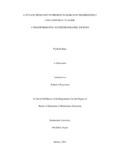
Please use this identifier to cite or link to this item:
https://hdl.handle.net/20.500.14301/269| Title: | A VOYAGE FROM PAST TO PRESENT IN SEARCH OF PROGRESSIVELY CHILD FRIENDLY TEACHER A TRANSFORMATIVE AUTOETHNOGRAPHIC JOURNEY |
| Authors: | Rajak, Prashant |
| Citation: | Rajak,P.(2014).A Voyage From Past To Present In Search Of Progressively Child Friendly Teacher: A Transformative Autoethnographic Journey |
| Issue Date: | Jan-2014 |
| Publisher: | Kathmandu University School of Education |
| School: | SOED |
| Department: | DOSE |
| Level: | Masters |
| Program: | Master of Education in Mathematics Education |
| Abstract: | This dissertation portrays my journey from an authoritative teacher towards the progressively child friendly teacher. My necessity to think that transformation is mandatory and being in the process of transforming self from an autocratic teacher to a gradually developing democratic teacher has been shown in this voyage. I had questions in my mind regarding various nature of mathematics which is changeable in the context, punishment in mathematics classroom , situating myself differently in the classroom so that the students loves the mathematics teacher and the mathematics subject and the alternative to corporal punishment. Toportray my research study, I have chosen an autoethnography as a method andmethodology of research. Critical research is selected as a key research paradigm. Autoethnography helped me to produce rich research text of my professional contexts of learning and teaching mathematics. The critical paradigm helped me to question my practice; critically reflect upon my teaching-learning experiences and to transform myself from traditional to a new one. I have taken critical theory and constructivism as my major guides. Verisimilitude (i.e., ii lifelikeness), pedagogical thoughtfulness (i.e., evoking readers) and critical reflexivity (i.e., questioning my subjectivities) are the quality standards of my research. While I started examining the nature of mathematics, I developed various views on it. I started viewing it from being an absolutist teacher progressively towards constructivist teacher through various terrains. Linking with the nature of mathematics, I tried to link it with the corporal punishment in the class. The teachers having no any other alternatives to corporal punishment as guided by absolutist assumption seems to practice it to a higher level. Viewing the nature of math from different perspective and looking at the classroom practice I have realized to change the way of dealing students with the corporal punishment. I have come to realize that in our context until we develop proper alternative to corporal punishment we may not be able to give complete freedom to the students. Due to the cultural diversity the students have their own perception about the punishment given in the class which leads to some kind of action against them in the class. Due to such environment from which they come they do not consider their responsibility and giving complete freedom may not be fruitful as desired. But this also does not mean that we need to give rise to corporal punishment. So, for mapping with transformation the need of continuum, which excludes corporal punishment, is realized. I hope to have used some ingredients of transformative learning and teaching. As a result, I felt like I could be a teacher researcher through my reflective practice. Furthermore, I have duly realized that reflective practice could be influential in bringing transformation in every one’s life and we should lead to help others to emancipate their thought, action and reactions for creating better-civilized citizens. |
| URI: | https://hdl.handle.net/20.500.14301/269 |
| Appears in Collections: | Dissertation |
Files in This Item:
| File | Description | Size | Format | |
|---|---|---|---|---|
| Dissertation_Prashant final for binding.pdf | 1.52 MB | Adobe PDF |  View/Open |
Items in DSpace are protected by copyright, with all rights reserved, unless otherwise indicated.